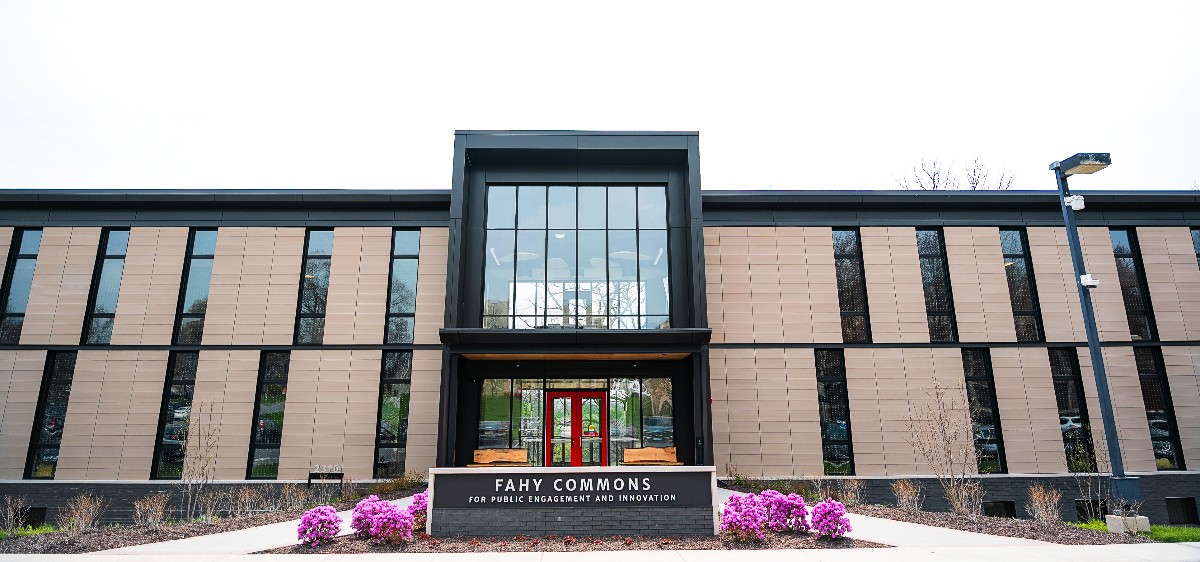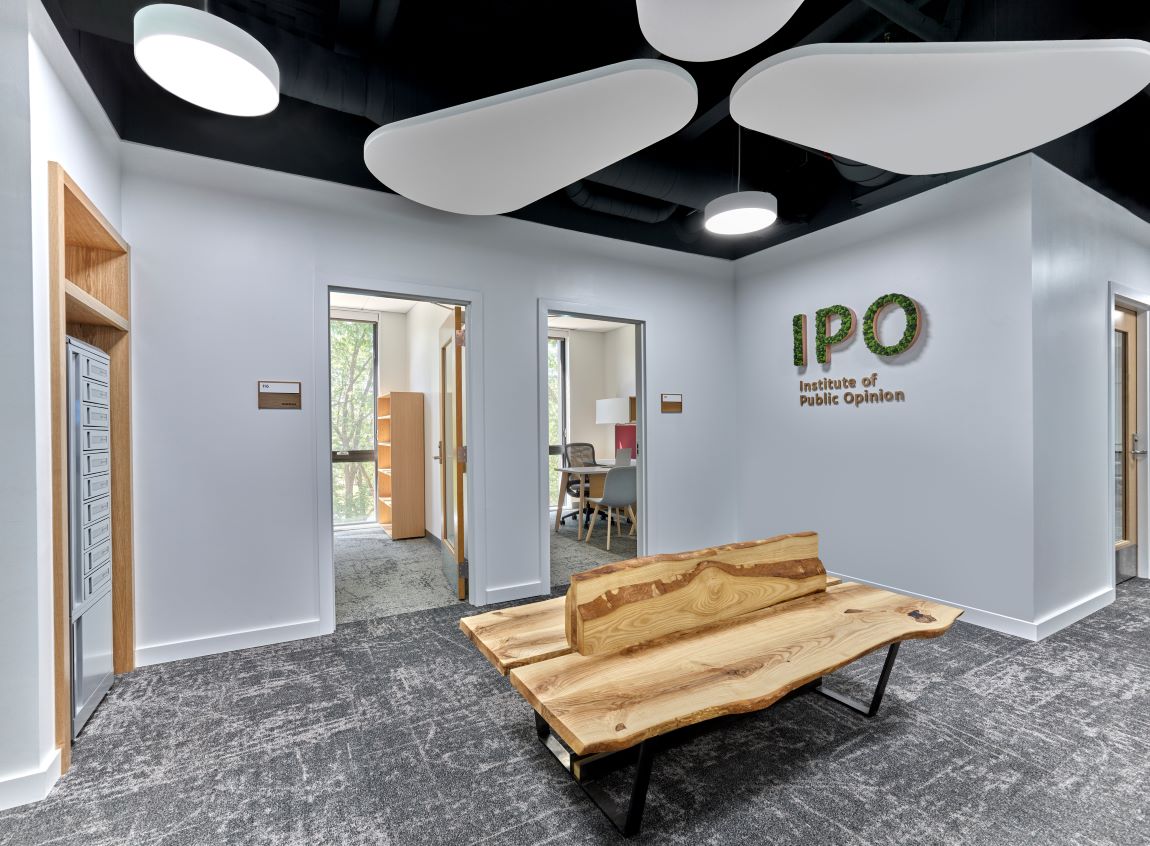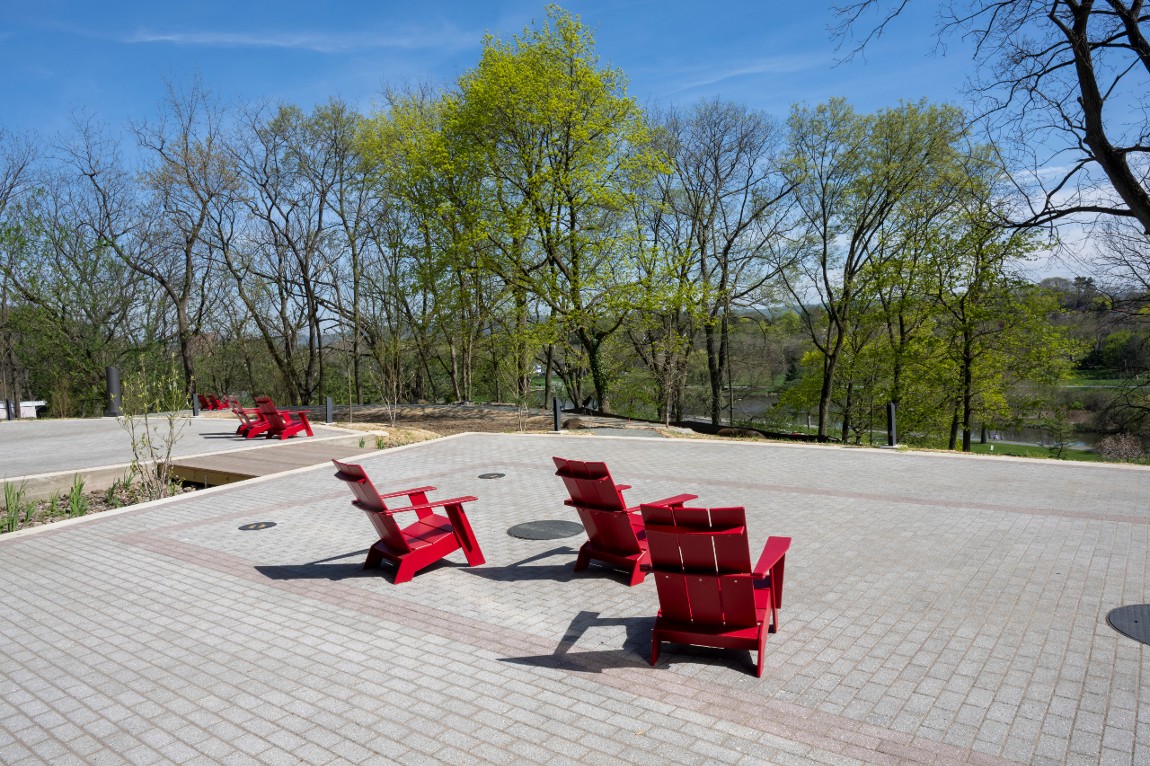Fahy Commons Named First in the World to Achieve Core Living Building Certification
The award-winning structure reflects the College’s deep commitment to sustainability, academics, creativity and community.By: Kristine Yahna Todaro Monday, April 22, 2024 07:47 AM

On March 26, Muhlenberg College’s newest academic building, The Fahy Commons for Public Engagement and Innovation, was named the first project in the world to achieve Core Living Building Certification, a program administered by the International Living Future Institute (ILFI).
The leading-edge building is LEED Platinum certified and was recently honored with three major sustainability and green-building awards. Fahy Commons is rooted in biophilic design, which brings visitors in touch with nature through both direct and indirect experiences. Visitors enter the building through a natively planted rain garden and once inside, enjoy sweeping views through the structure to a wooded hill sloping down to Cedar Beach Park and Lake Muhlenberg. At the entry vestibule, a sustainability dashboard displays real-time energy and solar information, as well as other information about the features of the building — from bee-friendly bricks to a meadow that helps remove carbon dioxide from the atmosphere.
“This certification is an enormous honor for the College as well as an important recognition of our institutional commitment to educate, inspire and lead by example,” says President Kathleen Harring. “Fahy Commons has quickly become a beloved hub on campus, sought after by our students and campus community members, whether for academic or creative pursuits, a tranquil study environment or the opportunity to feel closer to nature.”

The Core Living Building Certification is the entry point to the Living Building Challenge (LBC) administered by the ILFI. It focuses on 10 core practices seen as the baseline for deep green building. Following the primary structure of LBC, Core imperatives fall into seven divisions referred to as petals: place, water, energy, health + happiness, materials, equity and beauty.
“I firmly believe that buildings on a college's campus can and should do more than simply house students and academic endeavors, but rather also offer teachable moments,” says Rich Niesenbaum, professor of biology and director of Muhlenberg’s sustainability studies program. “As an innovative building in sustainable design and operation, our new Fahy Commons does exactly that for all who enter it because of the visibility of its many sustainable features. For students in sustainability studies, it has become a living laboratory for experiential learning as they monitor and assess the building's sustainable performance.”
The three-story building opened in January 2023 and was made possible through a generous gift from Gerald P. Fahy ’79 and Cathleen A. Fahy. Designed by Re:Vision Architecture, it facilitates connections among students, faculty, staff and the community. It features more than 20,000 square feet of student programming and academic space including the Office of Community Engagement, the Innovation & Entrepreneurship Program's Makerspace, the Institute of Public Opinion, the Division of Graduate and Continuing Education, Religious & Spiritual Life and new art studios and classroom spaces.

Fast facts about Fahy Commons:
- Core Living Building Certified, the first in the world
- LEED Platinum certified
- Verified energy use intensity of 8.9 kBTU per square foot.
- Rooftop photovoltaic array, with infrastructure in place for future expansion on the ground
- Very tightly constructed building envelope effectively maintains Passive House standards by keeping the outdoor elements at bay.
- High-efficiency HVAC system with continuous 100% fresh air ventilation provides comfortable and healthy interiors
- Verified 70% decrease in potable water use, including toilet flushing via a 10,000 gallon rainwater harvesting tank
- Restoration of a half-hectare carbon-sequestering meadow fosters soil health and biodiversity.
- Bird-safe glazing, designed in conjunction with Muhlenberg’s world-renowned ornithologist Daniel Klem, prevents window collisions
- Third-party diversity and inclusion assessment improves the social impact of the project
